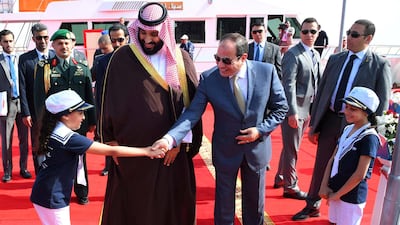The two main messages sent out by Mohammed bin Salman ahead of his visit to the British and US capitals were about Egypt and Lebanon. The first message assigned a special status to Egypt as Saudi Arabia's partner in confronting the challenges to the region and in economic projects, such as the Neom megacity plan. The second message reflected a decision to prevent Lebanon's collapse, as this would be neither in the Lebanese nor in the Saudi interest, replacing the erstwhile warnings and pressure issued to the country with the language of support.
The crown prince is on his first official visit in this capacity to London, Washington and New York to discuss trade options and diplomatic relations, but also to hold talks on Aramco's upcoming IPO, expected to be the largest in history, with London and New York competing to organise it.
In Cairo, Abdel Fattah El Sisi, the Egyptian president, received Prince Mohammed on the tarmac after his plane had been escorted into land by fighter jets to honour their guest and stress Egypt's appreciation for having been chosen as the first stop on this historic foreign tour. And indeed, choosing Cairo was clearly to affirm the alliance with Egypt. Both Riyadh and Abu Dhabi see Egypt as a fundamental component in the regional balance of power.
Prince Mohammed's remarks about the need to unite against the threats and challenges facing the Arab region, including terrorism and terror-supporting states, were a message addressed to Turkey, which Egypt accuses of backing the Muslim Brotherhood, and Iran, which Saudi Arabia accuses of sponsoring terrorism in Syria, Yemen, Bahrain, Iraq and Lebanon. Saudi Arabia and the UAE have provided assistance to Egypt to combat the Muslim Brotherhood. The three countries together with Bahrain are boycotting Qatar.
A project of personal significance to Prince Mohammed is Neom, a futuristic megacity project on the Red Sea. Mr El Sisi had approved an agreement granting the two islands of Tiran and Sanafir, crucial to the project, to Saudi Arabia, in a strategic maritime corridor that leads to the Israeli port of Eilat in the Gulf of Aqaba. The uninhabited islands were under Saudi sovereignty, but Riyadh asked Cairo to protect them in 1950, as the Egyptian government has acknowledged.
For this reason, Mr El Sisi vetoed a verdict by the constitutional court in Egypt regarding the agreement and removed any legal hurdles to the handover of the islands to Saudi Arabia.
Egypt is set to benefit from the joint project with Saudi Arabia on the Red Sea.
Yet there are several divergences between the two sides, including on regional issues such as Syria, Yemen, Libya and Lebanon. There are also differences concerning the levels of cooperation with major regional and international players, such as Russia, Iran, and Turkey. On the other hand, coordination continues between them on issues like Palestine and Israel. But despite the challenges, the main focus of the visit is Saudi investment in a stable Egypt.
This was the same theme of Saad Hariri's visit then return to Beirut from Riyadh. Mr Hariri confirmed Saudi Arabia would support the Lebanese Armed Forces and the country's ailing economy, through a high-level participation in the upcoming donor conferences seeking to raise funds for Lebanon. Secondly, there seems to be a new Saudi approach to Hezbollah and Mr Hariri's de facto ties to the party in the context of their coalition government. Thirdly, Saudi Arabia has once again endorsed Mr Hariri as its main partner in Lebanon. Fourthly, Saudi Arabia is coming around to the notion that allowing Lebanon to become a failing state does not serve its interests. On the contrary, it would only serve Hezbollah and its Iranian masters.
Lebanon's President Michel Aoun and Parliament Speaker Nabih Berri are further threads in the new Saudi approach to Lebanon, together with Mr Hariri.
The three leaders, who converge when it comes to safeguarding Lebanon’s stability as well as their own political interests, could drive a disengagement from Hezbollah, as the US steps up its sanctions, which it could designate as a “criminal” organisation, not only as a “terror” group as it already does.
This could entail unprecedented measures against Hezbollah’s popular base as well as its business associates.
Strategically, Saudi Arabia has not changed its position on Hezbollah. But pragmatically, it has decided to allow matters to take their course as a result of US measures and designations of the group as a narco-terrorist entity.
Therefore, the coming stage is one of containing but not confronting Hezbollah head-on, which requires investing in stabilisation rather than mobilisation.
Prince Mohammed arrived in London as a reformer and will arrive Washington as a visionary who sees eye to eye with the Trump administration. His inclusion of Iran, Turkey and terrorist organisations in the definition of the axis of evil fits squarely with Trump’s definition of “radical Islam”.
The Trump administration had widened the net to include not only terrorist organisations such as ISIL and Al Qaeda, but also the Muslim Brotherhood, which Turkey embraces, and radical groups spearheaded by Iran.
The London stop on Prince Mohammed's strategic trip abroad gave a clear hint of the UK’s readiness for a major shift in its regional alliances. Tehran is nervous.
But the Washington and New York stops are where major decisions will be made in this fascinating journey.


